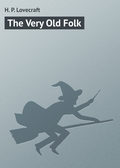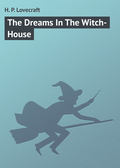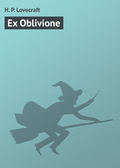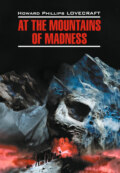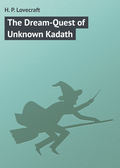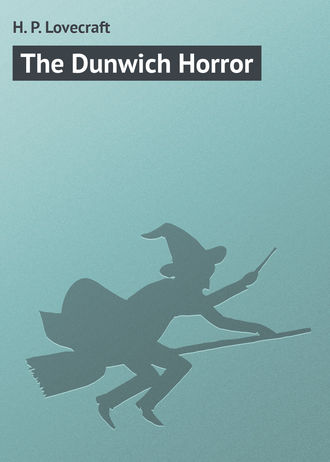
Говард Филлипс Лавкрафт
The Dunwich Horror
V
The following winter brought an event no less strange than Wilbur’s first trip outside the Dunwich region. Correspondence with the Widener Library at Harvard, the Bibliothèque Nationale in Paris, the British Museum, the University of Buenos Ayres, and the Library of Miskatonic University at Arkham had failed to get him the loan of a book he desperately wanted; so at length he set out in person, shabby, dirty, bearded, and uncouth of dialect, to consult the copy at Miskatonic, which was the nearest to him geographically. Almost eight feet tall, and carrying a cheap new valise from Osborne’s general store, this dark and goatish gargoyle appeared one day in Arkham in quest of the dreaded volume kept under lock and key at the college library – the hideous Necronomicon of the mad Arab Abdul Alhazred in Olaus Wormius’ Latin version, as printed in Spain in the seventeenth century. He had never seen a city before, but had no thought save to find his way to the university grounds; where indeed, he passed heedlessly by the great white-fanged watchdog that barked with unnatural fury and enmity, and tugged frantically at its stout chain.
Wilbur had with him the priceless but imperfect copy of Dr Dee’s English version which his grandfather had bequeathed him, and upon receiving access to the Latin copy he at once began to collate the two texts with the aim of discovering a certain passage which would have come on the 751st page of his own defective volume. This much he could not civilly refrain from telling the librarian – the same erudite Henry Armitage (A.M. Miskatonic, Ph.D. Princeton, Litt.D. Johns Hopkins) who had once called at the farm, and who now politely plied him with questions. He was looking, he had to admit, for a kind of formula or incantation containing the frightful name Yog-Sothoth, and it puzzled him to find discrepancies, duplications, and ambiguities which made the matter of determination far from easy. As he copied the formula he finally chose, Dr Armitage looked involuntarily over his shoulder at the open pages; the left-hand one of which, in the Latin version, contained such monstrous threats to the peace and sanity of the world.
Nor is it to be thought (ran the text as Armitage mentally translated it) that man is either the oldest or the last of earth’s masters, or that the common bulk of life and substance walks alone. The Old Ones were, the Old Ones are, and the Old Ones shall be. Not in the spaces we know, but between them, they walk serene and primal, undimensioned and to us unseen. Yog-Sothoth knows the gate. Yog-Sothoth is the gate. Yog-Sothoth is the key and guardian of the gate. Past, present, future, all are one in Yog-Sothoth. He knows where the Old Ones broke through of old, and where They shall break through again. He knows where They had trod earth’s fields, and where They still tread them, and why no one can behold Them as They tread. By Their smell can men sometimes know Them near, but of Their semblance can no man know, saving only in the features of those They have begotten on mankind; and of those are there many sorts, differing in likeness from man’s truest eidolon to that shape without sight or substance which is Them. They walk unseen and foul in lonely places where the Words have been spoken and the Rites howled through at their Seasons. The wind gibbers with Their voices, and the earth mutters with Their consciousness. They bend the forest and crush the city, yet may not forest or city behold the hand that smites. Kadath in the cold waste hath known Them, and what man knows Kadath? The ice desert of the South and the sunken isles of Ocean hold stones whereon Their seal is engraver, but who hath seen the deep frozen city or the sealed tower long garlanded with seaweed and barnacles? Great Cthulhu is Their cousin, yet can he spy Them only dimly. Iä! Shub-Niggurath! As a foulness shall ye know Them. Their hand is at your throats, yet ye see Them not; and Their habitation is even one with your guarded threshold. Yog-Sothoth is the key to the gate, whereby the spheres meet. Man rules now where They ruled once; They shall soon rule where man rules now. After summer is winter, after winter summer. They wait patient and potent, for here shall They reign again.
Dr. Armitage, associating what he was reading with what he had heard of Dunwich and its brooding presences, and of Wilbur Whateley and his dim, hideous aura that stretched from a dubious birth to a cloud of probable matricide, felt a wave of fright as tangible as a draught of the tomb’s cold clamminess. The bent, goatish giant before him seemed like the spawn of another planet or dimension; like something only partly of mankind, and linked to black gulfs of essence and entity that stretch like titan phantasms beyond all spheres of force and matter, space and time. Presently Wilbur raised his head and began speaking in that strange, resonant fashion which hinted at sound-producing organs unlike the run of mankind’s.
‘Mr Armitage,’ he said, ‘I calc’late I’ve got to take that book home. They’s things in it I’ve got to try under sarten conditions that I can’t git here, en’ it ‘ud be a mortal sin to let a red-tape rule hold me up. Let me take it along, Sir, an’ I’ll swar they wun’t nobody know the difference. I dun’t need to tell ye I’ll take good keer of it. It wan’t me that put this Dee copy in the shape it is…’
He stopped as he saw firm denial on the librarian’s face, and his own goatish features grew crafty. Armitage, half-ready to tell him he might make a copy of what parts he needed, thought suddenly of the possible consequences and checked himself. There was too much responsibility in giving such a being the key to such blasphemous outer spheres. Whateley saw how things stood, and tried to answer lightly.
‘Wal, all right, ef ye feel that way abaout it. Maybe Harvard won’t be so fussy as yew be.’ And without saying more he rose and strode out of the building, stooping at each doorway.
Armitage heard the savage yelping of the great watchdog, and studied Whateley’s gorilla-like lope as he crossed the bit of campus visible from the window. He thought of the wild tales he had heard, and recalled the old Sunday stories in the Advertiser; these things, and the lore he had picked up from Dunwich rustics and villagers during his one visit there. Unseen things not of earth – or at least not of tri-dimensional earth – rushed foetid and horrible through New England’s glens, and brooded obscenely on the mountain tops. Of this he had long felt certain. Now he seemed to sense the close presence of some terrible part of the intruding horror, and to glimpse a hellish advance in the black dominion of the ancient and once passive nightmare. He locked away the Necronomicon with a shudder of disgust, but the room still reeked with an unholy and unidentifiable stench. ‘As a foulness shall ye know them,’ he quoted. Yes – the odour was the same as that which had sickened him at the Whateley farmhouse less than three years before. He thought of Wilbur, goatish and ominous, once again, and laughed mockingly at the village rumours of his parentage.
‘Inbreeding?’ Armitage muttered half-aloud to himself. ‘Great God, what simpletons! Show them Arthur Machen’s Great God Pan and they’ll think it a common Dunwich scandal! But what thing – what cursed shapeless influence on or off this three-dimensional earth – was Wilbur Whateley’s father? Born on Candlemas – nine months after May Eve of 1912, when the talk about the queer earth noises reached clear to Arkham – what walked on the mountains that May night? What Roodmas horror fastened itself on the world in half-human flesh and blood?’
During the ensuing weeks Dr Armitage set about to collect all possible data on Wilbur Whateley and the formless presences around Dunwich. He got in communication with Dr Houghton of Aylesbury, who had attended Old Whateley in his last illness, and found much to ponder over in the grandfather’s last words as quoted by the physician. A visit to Dunwich Village failed to bring out much that was new; but a close survey of the Necronomicon, in those parts which Wilbur had sought so avidly, seemed to supply new and terrible clues to the nature, methods, and desires of the strange evil so vaguely threatening this planet. Talks with several students of archaic lore in Boston, and letters to many others elsewhere, gave him a growing amazement which passed slowly through varied degrees of alarm to a state of really acute spiritual fear. As the summer drew on he felt dimly that something ought to be done about the lurking terrors of the upper Miskatonic valley, and about the monstrous being known to the human world as Wilbur Whateley.
VI
The Dunwich horror itself came between Lammas and the equinox in 1928, and Dr Armitage was among those who witnessed its monstrous prologue. He had heard, meanwhile, of Whateley’s grotesque trip to Cambridge, and of his frantic efforts to borrow or copy from the Necronomicon at the Widener Library. Those efforts had been in vain, since Armitage had issued warnings of the keenest intensity to all librarians having charge of the dreaded volume. Wilbur had been shockingly nervous at Cambridge; anxious for the book, yet almost equally anxious to get home again, as if he feared the results of being away long.
Early in August the half-expected outcome developed, and in the small hours of the third Dr Armitage was awakened suddenly by the wild, fierce cries of the savage watchdog on the college campus. Deep and terrible, the snarling, half-mad growls and barks continued; always in mounting volume, but with hideously significant pauses. Then there rang out a scream from a wholly different throat – such a scream as roused half the sleepers of Arkham and haunted their dreams ever afterwards – such a scream as could come from no being born of earth, or wholly of earth.
Armitage, hastening into some clothing and rushing across the street and lawn to the college buildings, saw that others were ahead of him; and heard the echoes of a burglar-alarm still shrilling from the library. An open window showed black and gaping in the moonlight. What had come had indeed completed its entrance; for the barking and the screaming, now fast fading into a mixed low growling and moaning, proceeded unmistakably from within. Some instinct warned Armitage that what was taking place was not a thing for unfortified eyes to see, so he brushed back the crowd with authority as he unlocked the vestibule door. Among the others he saw Professor Warren Rice and Dr Francis Morgan, men to whom he had told some of his conjectures and misgivings; and these two he motioned to accompany him inside. The inward sounds, except for a watchful, droning whine from the dog, had by this time quite subsided; but Armitage now perceived with a sudden start that a loud chorus of whippoorwills among the shrubbery had commenced a damnably rhythmical piping, as if in unison with the last breaths of a dying man.
The building was full of a frightful stench which Dr Armitage knew too well, and the three men rushed across the hall to the small genealogical reading-room whence the low whining came. For a second nobody dared to turn on the light, then Armitage summoned up his courage and snapped the switch. One of the three – it is not certain which – shrieked aloud at what sprawled before them among disordered tables and overturned chairs. Professor Rice declares that he wholly lost consciousness for an instant, though he did not stumble or fall.
The thing that lay half-bent on its side in a foetid pool of greenish-yellow ichor and tarry stickiness was almost nine feet tall, and the dog had torn off all the clothing and some of the skin. It was not quite dead, but twitched silently and spasmodically while its chest heaved in monstrous unison with the mad piping of the expectant whippoorwills outside. Bits of shoe-leather and fragments of apparel were scattered about the room, and just inside the window an empty canvas sack lay where it had evidently been thrown. Near the central desk a revolver had fallen, a dented but undischarged cartridge later explaining why it had not been fired. The thing itself, however, crowded out all other images at the time. It would be trite and not wholly accurate to say that no human pen could describe it, but one may properly say that it could not be vividly visualized by anyone whose ideas of aspect and contour are too closely bound up with the common life-forms of this planet and of the three known dimensions. It was partly human, beyond a doubt, with very manlike hands and head, and the goatish, chinless face had the stamp of the Whateley’s upon it. But the torso and lower parts of the body were teratologically fabulous, so that only generous clothing could ever have enabled it to walk on earth unchallenged or uneradicated.
Above the waist it was semi-anthropomorphic; though its chest, where the dog’s rending paws still rested watchfully, had the leathery, reticulated hide of a crocodile or alligator. The back was piebald with yellow and black, and dimly suggested the squamous covering of certain snakes. Below the waist, though, it was the worst; for here all human resemblance left off and sheer phantasy began. The skin was thickly covered with coarse black fur, and from the abdomen a score of long greenish-grey tentacles with red sucking mouths protruded limply.
Their arrangement was odd, and seemed to follow the symmetries of some cosmic geometry unknown to earth or the solar system. On each of the hips, deep set in a kind of pinkish, ciliated orbit, was what seemed to be a rudimentary eye; whilst in lieu of a tail there depended a kind of trunk or feeler with purple annular markings, and with many evidences of being an undeveloped mouth or throat. The limbs, save for their black fur, roughly resembled the hind legs of prehistoric earth’s giant saurians, and terminated in ridgy-veined pads that were neither hooves nor claws. When the thing breathed, its tail and tentacles rhythmically changed colour, as if from some circulatory cause normal to the non-human greenish tinge, whilst in the tail it was manifest as a yellowish appearance which alternated with a sickly grayish-white in the spaces between the purple rings. Of genuine blood there was none; only the foetid greenish-yellow ichor which trickled along the painted floor beyond the radius of the stickiness, and left a curious discoloration behind it.
As the presence of the three men seemed to rouse the dying thing, it began to mumble without turning or raising its head. Dr Armitage made no written record of its mouthings, but asserts confidently that nothing in English was uttered. At first the syllables defied all correlation with any speech of earth, but towards the last there came some disjointed fragments evidently taken from the Necronomicon, that monstrous blasphemy in quest of which the thing had perished. These fragments, as Armitage recalls them, ran something like ‘N’gai, n’gha’ghaa, bugg-shoggog, y’hah: Yog-Sothoth, Yog-Sothoth…’ They trailed off into nothingness as the whippoorwills shrieked in rhythmical crescendos of unholy anticipation.
Then came a halt in the gasping, and the dog raised its head in a long, lugubrious howl. A change came over the yellow, goatish face of the prostrate thing, and the great black eyes fell in appallingly. Outside the window the shrilling of the whippoorwills had suddenly ceased, and above the murmurs of the gathering crowd there came the sound of a panic-struck whirring and fluttering. Against the moon vast clouds of feathery watchers rose and raced from sight, frantic at that which they had sought for prey.
All at once the dog started up abruptly, gave a frightened bark, and leaped nervously out of the window by which it had entered. A cry rose from the crowd, and Dr Armitage shouted to the men outside that no one must be admitted till the police or medical examiner came. He was thankful that the windows were just too high to permit of peering in, and drew the dark curtains carefully down over each one. By this time two policemen had arrived; and Dr Morgan, meeting them in the vestibule, was urging them for their own sakes to postpone entrance to the stench-filled reading-room till the examiner came and the prostrate thing could be covered up.
Meanwhile frightful changes were taking place on the floor. One need not describe the kind and rate of shrinkage and disintegration that occurred before the eyes of Dr Armitage and Professor Rice; but it is permissible to say that, aside from the external appearance of face and hands, the really human element in Wilbur Whateley must have been very small. When the medical examiner came, there was only a sticky whitish mass on the painted boards, and the monstrous odour had nearly disappeared. Apparently Whateley had had no skull or bony skeleton; at least, in any true or stable sense. He had taken somewhat after his unknown father.



